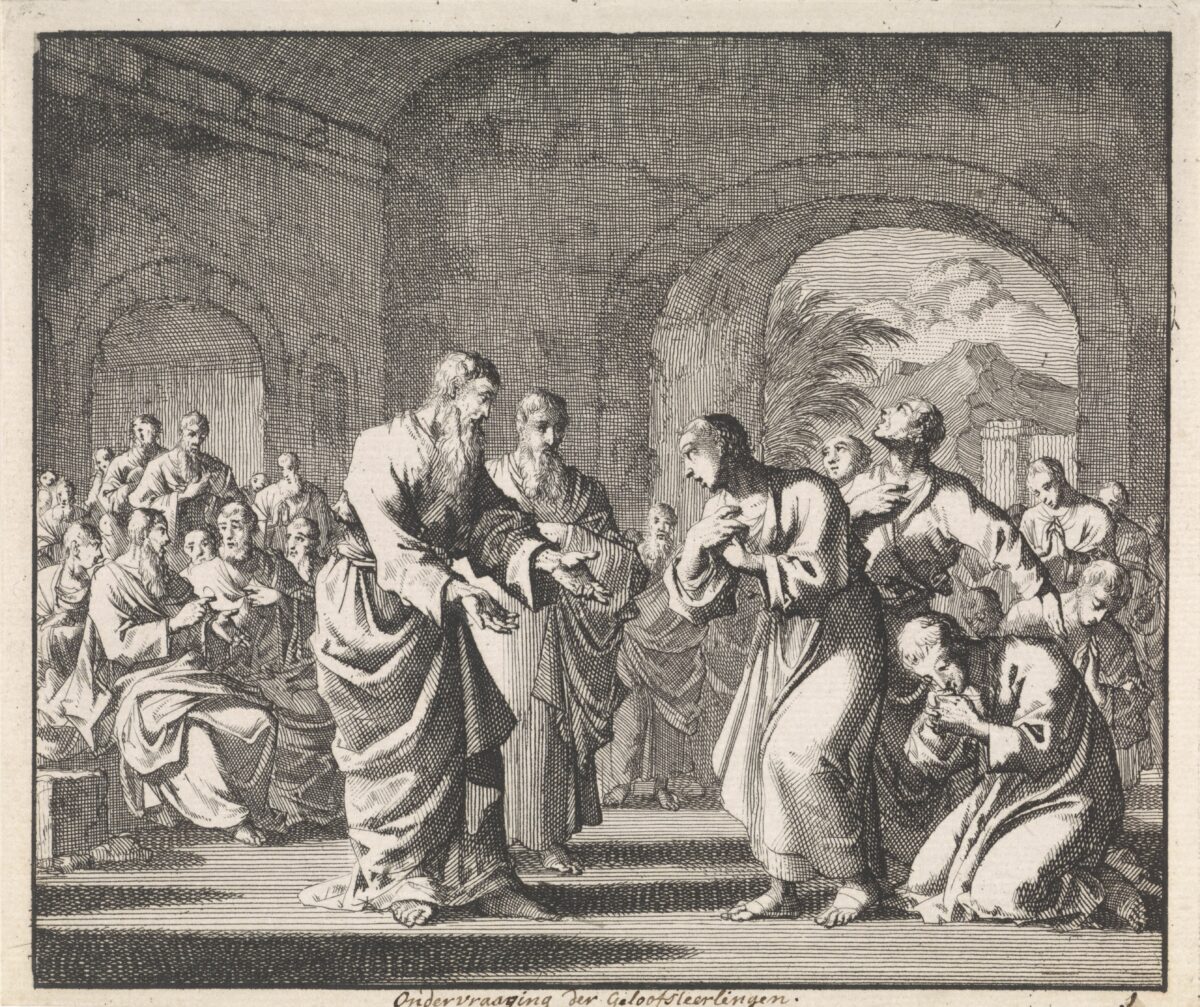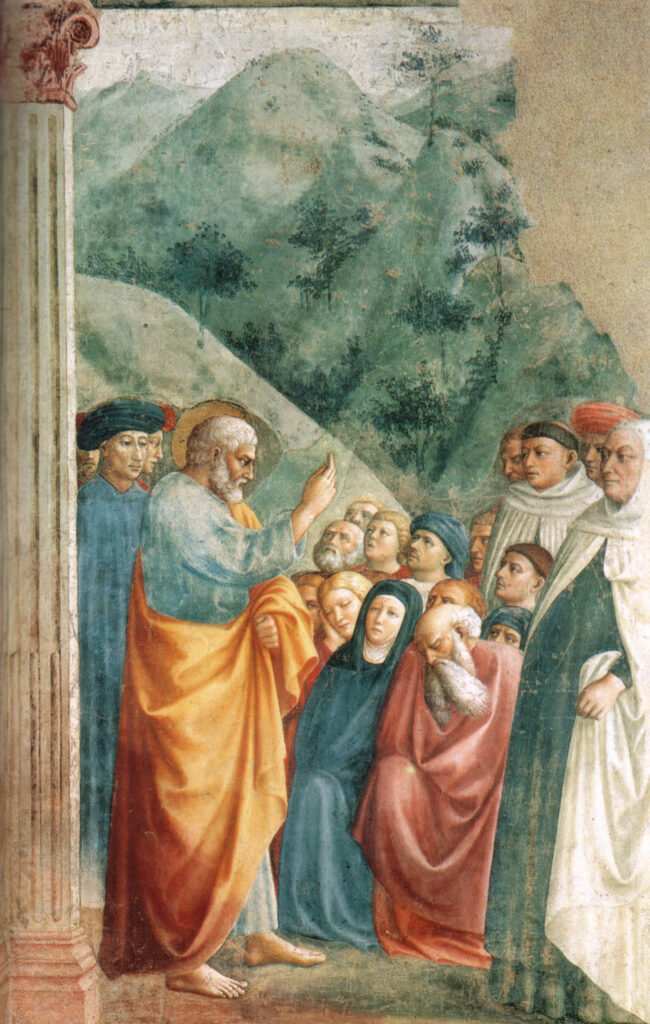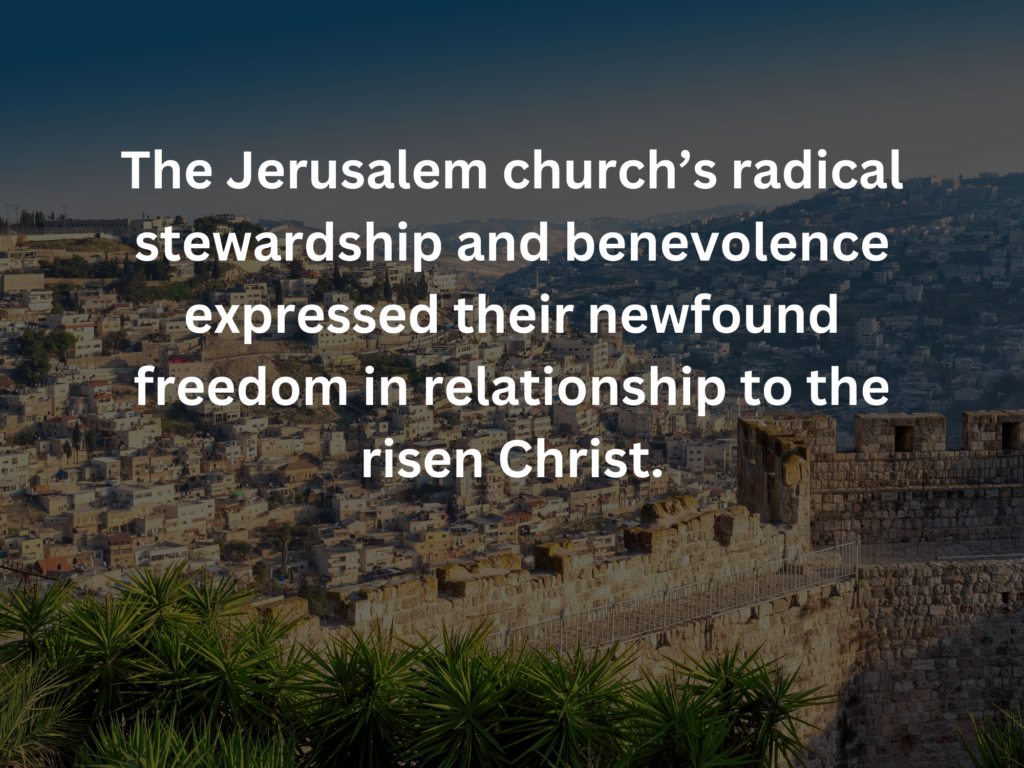More Than Enough
Acts 2:42-47
Fourth Sunday of Easter
Analysis by Brad Haugen
42They devoted themselves to the apostles’ teaching and fellowship, to the breaking of bread and the prayers.
43Awe came upon everyone, because many wonders and signs were being done by the apostles. 44All who believed were together and had all things in common; 45they would sell their possessions and goods and distribute the proceeds to all, as any had need. 46Day by day, as they spent much time together in the temple, they broke bread at home and ate their food with glad and generous hearts, 47praising God and having the goodwill of all the people. And day by day the Lord added to their number those who were being saved.
The Jerusalem church’s radical stewardship and benevolence expressed their newfound freedom in relationship to the risen Christ.
DIAGNOSIS: Never Enough on Our Own
Step 1: Initial Diagnosis (External Problem): Not Enough
Rather than sharing all things in common, we tend to hold things more in competition with one another. Habits of comparing and competing drive people to possess their possessions and money and call it their own. “This is mine. That is yours.” Granted, we have worked for and earned some of what we own. But not all of it.
Overwhelmingly, we feel that what we have is not enough. Comparing ourselves to others who have more of what we want—more of the right stuff—we are driven to compete. We are compelled to feel that we never have enough. Having identified ourselves so closely with money and possessions, of which we’re already convinced we don’t have enough, we see ourselves as lacking and not being enough.
Step 2: Advanced Diagnosis (Internal Problem): Not Enough in Common
When Acts 2:42-47 comes up in the Revised Common Lectionary, we might see a blueprint or strategic plan to resolve the problem of not having enough. “All who believed were together and had all things in common; they would sell their possessions and goods and distribute the proceeds to all, as any had need” (Acts 2:44-45 NRSV).
“Why can’t our churches fit this picture?” we wonder. Why can’t we give more out of what we share as a church and have in common? After all, that there are and continue to be ever-increasing human needs is unquestionable.
If only we could clearly distinguish our needs from our wants, then we could
be content with meeting our needs and having enough. Next, we could share the proceeds from selling our non-essentials with any who had need.
The problem is we’re just not sharing enough. Furthermore, we can’t all agree on what our needs are and what our wants are. So, we can’t have all things in common—not even in church, sometimes especially in church. Besides, how can we trust that other people are asking for what they really need? And how much help is enough?
As a passage that conveys God’s law, Acts 2:42-47 holds up an ideal of stewardship and benevolence that congregations with flawed human beings cannot attain through their own human efforts alone.
Step 3: Final Diagnosis (Eternal Problem): Nothing in Common with God
Earlier in Acts and prior to the common life of the Jerusalem church portrayed in Acts 2:42-47, the apostle Peter preached a sermon in Jerusalem during what was then called the Feast of Weeks. God’s Word was set loose during Peter’s sermon, along with the power of the Holy Spirit. The activity of God’s Word and Spirit composed the events we know as Pentecost.
Peter’s sermon delivered God’s law: the clearest revelation that humankind had become enemies of God and couldn’t live as God’s people. Jesus’ crucifixion was humankind’s doing. The crucifixion of Christ is a testament that God and humanity are fundamentally at odds, rather than having all things in common. As Peter proclaimed to the crowd: “Jesus of Nazareth, a man attested to you by God with deeds of power, wonder, and signs that God did through him among you, as you yourselves know – this man, handed over to you according to the definite plan and foreknowledge of God, you crucified and killed by the hands of those outside the law” (Acts 2:22-23NRSV).
This man, Jesus, you crucified and killed: Peter’s stinging truth delivers God’s convicting Word which resounds throughout the ages. Through our own complicity in Christ’s crucifixion—our refusal to fear, love, and trust a God who is willingly crucified—we show that we have nothing in common with this God. We are thereby forsaken by God.
PROGNOSIS: More Than Enough in and with Christ Risen
Step 4: Initial Prognosis (Eternal Solution): Having Christ in Common
Peter’s sermon, however, isn’t over yet. He concludes: “But God raised [Jesus] up, having freed him from death, because it was impossible for him to be held in its power. […] This Jesus God raised up, and of that all of us are witnesses” (Acts 2:24, 32).
Although Christ’s crucifixion sentences all people to death, the power of Christ’s resurrection frees all people from death. Because the risen Christ forgives enemies of God like us, we and all people have a common need for Christ and his love that overcomes death. Despite all that we don’t hold in common with God and other people, we have Christ in common. We share a common witness to the truth of Christ’s resurrection, which raises us all to new life with God in relationship to the risen Christ. As Peter proclaims, “…of that all of us are witnesses.”
Step 5: Advanced Prognosis (Internal Solution): More than Enough in Christ
Fast forward from Peter’s sermon and the events of Pentecost, ahead to Acts 2:44-45: “All who believed were together and had all things in common; they would sell their possessions and goods and distribute the proceeds to all, as any had need.” In the light of their common witness to and belief in Christ’s death and resurrection, they experienced more than enough freedom through Christ to share, sell, and distribute possessions and goods as need arose.
Having all things in common, selling their possessions, and distributing the proceeds did not remain an impossible ideal for which they strived and fell short. Rather, the Jerusalem church’s radical stewardship and benevolence expressed their newfound freedom in relationship to the risen Christ. They had enough to share, sell, and distribute because through Christ they experienced more than enough freedom from human competitiveness, fear, distrust, and greed.
To paraphrase the Roman Catholic priest who hosted and gave the welcome at this year’s ecumenical Good Friday service in which I participated: “When Jesus prayed that his followers would be one, I believe this is what he had in mind.” He was referring to our ecumenical gathering, our commitment to worship together in Christian unity and to hear the words of the crucified Lord, which we have in common.
Step 6: Final Prognosis (External Solution): More than Enough in Community with Christ
As I write this, I am reminded of the offering collected at our recent Good Friday ecumenical service. The offering contributes to our local church ministerium association’s benevolence fund. In small but significant ways, the churches of our community—as a ministerium using our common benevolence fund—respond to the needs of our community.
Having heard the words of Christ crucified and risen, we trust that he loves us more than enough, and we grow in the freedom that is ours through him. As we live together in community with Christ, we take more opportunities to help meet our neighbor’s needs. Rather than the nagging fears or doubts of “not having enough,” living together in community with the risen Christ opens our eyes to the needs of our neighbors more than ever before. Finally, there are more opportunities to share when Christ enables us and our congregations to trust that we have enough to share.






You must be logged in to post a comment.